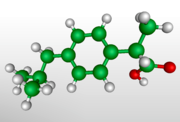Acetaminophen and ibuprofen are the most frequently used over-the-counter analgesics and antipyretics in children. However, their efficacy and safety are unknown for this use. Some studies in adults have shown that ibuprofen is more effective or as effective in pain relief compared with acetaminophen, but these results cannot be extrapolated to children. Studies in children have shown that ibuprofen may be more effective than acetaminophen, but that it potentially has more side effects. Perrott and colleagues performed a meta-analysis on the efficacy and safety of single-dose acetaminophen and ibuprofen in the treatment of children's pain or fever.
The authors searched multiple databases for randomized clinical trials that reviewed the efficacy and safety of acetaminophen and ibuprofen in the treatment of fever or moderate to severe pain in patients younger than 18 years. The trials had to include treatment arms that were assigned randomly. Outcome measures extracted from the data included risk ratio for achieving at least 50 percent of maximum pain relief, effect size for febrile temperature reduction, and the risk ratio for minor and major harm for a single dose of acetaminophen versus ibuprofen.
There were 17 studies that met the inclusion criteria for the analysis, with three evaluating pain relief, 10 assessing fever reduction, and 17 providing safety information. For pain relief, ibuprofen (4 to 10 mg per kg) and acetaminophen (7 to 15 mg per kg) had similar efficacy. Ibuprofen (5 to 10 mg per kg) provided a greater temperature reduction at two, four, and six hours after treatment com-pared with acetaminophen at the 10 to 15 mg per kg dosage. Safety information analysis showed no significant difference in the incidence of minor or major harm when ibuprofen was compared with acetaminophen. There also was no significant difference in safety when acetaminophen and ibuprofen were each compared with placebo during these short-term studies.
The authors conclude that acetaminophen and ibuprofen have similar analgesic effects in relieving moderate to severe pain, but ibuprofen has better antipyretic properties. Both acetaminophen and ibuprofen were shown to be safe in this study for short-term use.
KARL E. MILLER, M.D.
Perrott DA, et al. Efficacy and safety of acetaminophen vs ibuprofen for treating children's pain or fever. A meta-analysis. Arch Pediatr Adolesc Med June 2004;158:521-6.
COPYRIGHT 2005 American Academy of Family Physicians
COPYRIGHT 2005 Gale Group



